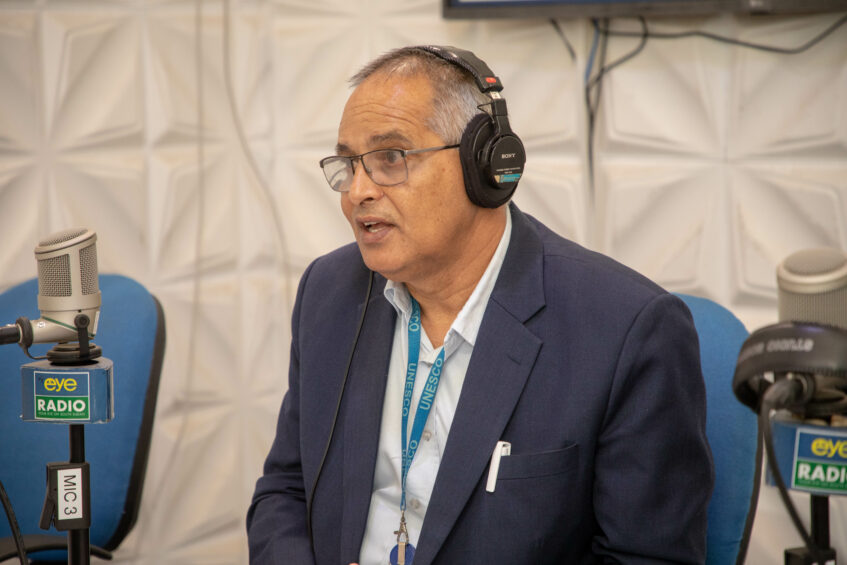
Tap Raj, the Head of the Education Unit for UNESCO speaks on Eye Radio's Sundown Program. (Photo: Awan Moses/Eye Radio).
The UN cultural agency – UNESCO says the incorporation of mother languages into lower primary school syllabuses is important in maximizing the enrollment of learners.
The remarks come as the world International Mother Language Day under the theme: “multilingual education – a necessity to transform education’.
Tap Raj, the Head of the Education Unit for UNESCO said cultural and linguistic diversity is importanr for sustainable societies and that the same should be extended to schools.
“Government need to prepare targeted interventions to those people who are living in remote areas, who are representing nomadic population, that is why their language need to be promoted under one hand,” he said.
Raj also said the incorporation of mother languages in schools is vital for preserving the differences in cultures and languages that foster tolerance and respect for others.
South Sudan is a multilingual country, with over 60 indigenous languages.
The UNESCO official implored that prioritizing national languages in lower primary schools is one way in bringing those remote areas to comfortably partake into learning systems before switching into other foreign languages.
“To ensure their right to education. You need to actually bring them into the system, education system and to bring them into education system.”
“Their culture, even classroom should reflect their culture, their language and all these things and then if the medium of instruction for those people is considered as their mother tongue, they will feel more comfortable to go to the school.”
Speaking during Eye Radio’s Sundown Program on Monday, Raj called on the government to prioritize mother language in lower primary schools’ syllabuses.
Moses Mading Marial is the Director General for Local and Foreign Languages at the National Ministry of General Education and Instruction.
He said the government plans to incorporate the local languages in the education system, with five languages already translated while others are yet to be inscribed.
Mading said the ministry will then train teachers after the languages are put to writings.
“We have a major plan to produce reading materials and to translate the subject books; four of them to their mother tongues so that they are thought from P.1 up to P.3 with their mother tongues,”he said.
“Science, mathematics, CRE, social science is translated. Now we have finished with five languages, we are moving to ten languages so that their materials should be produced, and the teachers be trained in the state so that they teach that.”
International Mother Language Day was the initiative of Bangladesh that was later approved at the 1999 UNESCO General Conference and has been observed throughout the world since 2000.
Support Eye Radio, the first independent radio broadcaster of news, information & entertainment in South Sudan.
Make a monthly or a one off contribution.
Copyright 2024. All rights reserved. Eye Radio is a product of Eye Media Limited.